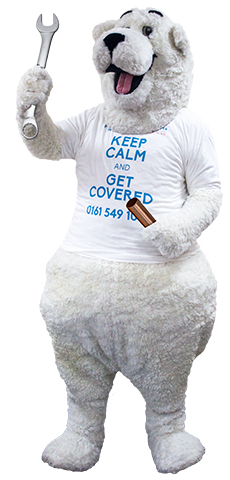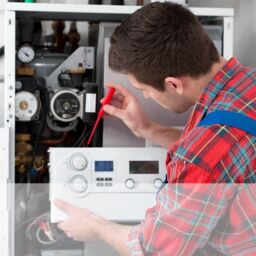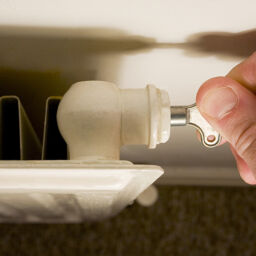Your boiler is likely to be the most expensive appliance in your home. Not only is purchasing a new boiler a costly undertaking, but it is an important investment, which is why you ought to do your research. We have created a comprehensive guide to choosing the perfect boiler for your home. Whether your current boiler is near the end of its life or you’re simply looking to upgrade to a more efficient system, this guide will help you make an informed decision.
Choosing the right boiler for you
Boiler efficiency is an important consideration when purchasing the make and model of your boiler. A more efficient system will waste less energy, save you money on bills and help the planet.
Types of gas boiler
There are three common gas boiler types: combination boilers, conventional boilers and system boilers.
What is a combi boiler and how does it work?
Combination (combi) boilers are the most popular in the UK. They combine your heating and hot water into one compact unit. Water is heated directly from the main so there is no need for an additional water tank.
Pros
- Easy to maintain and install
- No need for an additional water tank
- High fuel efficiency
- Save money on energy bills
- Compact unit saves space
- Clean and safe
Cons
- Low water pressure when running taps/showers at the same time
- Expensive to fix
- Requires good water pressure
- Both heating and hot water loss will result from combi boiler breakdown
What is a conventional boiler and how does it work?
Conventional boilers are a more traditional type of boiler, usually found in older, larger properties. They are open-vent boilers with a large tank of cold water in the loft and a hot water cylinder (typically found in the airing cupboard). Cold water from the main fills up the cold-water tank, which feeds water into the boiler unit to heat. The water from the boiler is pumped into the hot water cylinder and stored for use with heating and hot water.
Pros
- Hot water can be supplied to multiple taps and showers at once
- Works well in homes with low water pressure
- Easy maintenance
Cons
- Requires more space (for two water tanks)
- Heat loss if cylinder is not adequately insulated
- May take time for hot water to reach the taps
- Expensive installation
- The size of the hot water cylinder will determine how much hot water you’ll have
What is a system boiler and how does it work?
A system boiler is similar to a conventional boiler. However, it requires less space because a cold-water cylinder is not needed. Once heated, the water is transferred from the boiler to the hot water cylinder.
Pros
- Requires less space than a conventional
- Easier installation than conventional
Cons
- Requires space for a hot water cylinder
- May take time for hot water to reach tap/shower
- Heat loss may occur if the cylinder is not adequately insulated
- The size of the hot water cylinder will determine how much water you’ll have

Size
When purchasing a boiler, it is important to keep two things in mind in relation to size:
- Whether the dimensions of the boiler are compatible with the size of your home
- The power of the boiler to heat your home
Size of your home
In a smaller home with less space, a more compact boiler system will be needed in comparison to a home which is more spacious. In order to provide sufficient heating and hot water throughout a larger household with multiple bathrooms and radiators, a different boiler system may be more practical. For a small flat, a compact combi boiler would be perfect, whereas for a larger home, a conventional or system boiler may be a better choice.
Water pressure
While newer homes usually have good water pressure, older builds with weaker water pressure may require a conventional boiler.
Insulation and heat loss
If your home is not adequately insulated, you will need a more powerful boiler to compensate for heat loss.
What type of boiler do you need?
Small flat (one bedroom)
A combi boiler of 24kW or less may be the best choice for a smaller home as combi boilers are highly efficient and more compact.
Medium sized home (2-3 bedrooms)
A medium-sized combi boiler or a small conventional or system boiler will work well in a medium-sized home. For a property with multiple bathrooms, a conventional or system boiler may be more appropriate.
Large homes (4 or more bedrooms)
A large combi or system boiler will be best suited to a larger home. Additional water tanks will be able to supply water to multiple bathrooms at the same time. Depending on how insulated the home is, a 28kW or 30kW boiler is the best choice.
Note that the information provided is a rough guide. It is always best to seek more specific advice from a certified gas engineer.
Brand
Be prepared to do your research to find the most reliable and efficient boiler brands, on impartial sites, as some installers may be incentivised to install certain brands of boiler. We recommend Worcester Bosch, Vaillant and Glow Worm.
We particularly recommend Worcester Bosch Greenstar 30i because they are incredibly fuel efficient and–should your boiler break down–the parts are easily sourced.
Installation
You can find a local, certified gas engineer on the Gas Safe Register. We recommend seeking expert advice when choosing a boiler and getting quotes from different installers to ensure the best installation.
It is important to keep in mind the warranty length and aftercare provided by the manufacturer and the installer. Boilers last 10 years on average, during which time it is necessary to get an annual service to keep the warranty valid. You should also consider taking out a boiler cover policy in case your boiler breaks down, and to take care of routine checks and maintenance.
When choosing your boiler, it is important that you do your own research as well as seek expert advice from a certified engineer. For more information on choosing the perfect boiler for your home, call our friendly team on 0800 112 3697.



